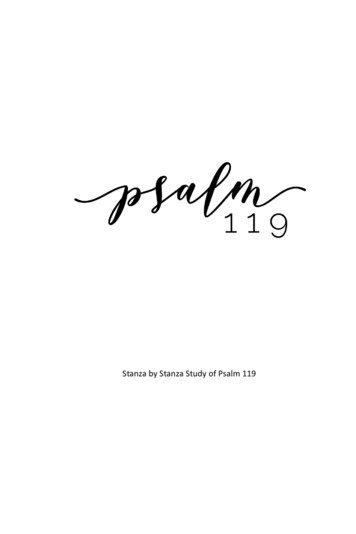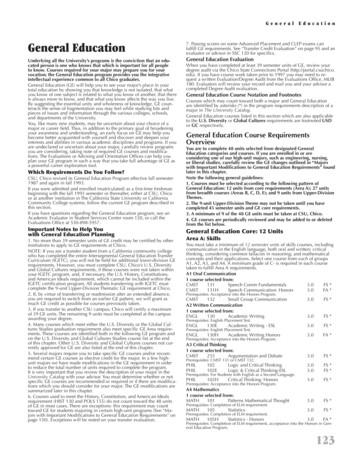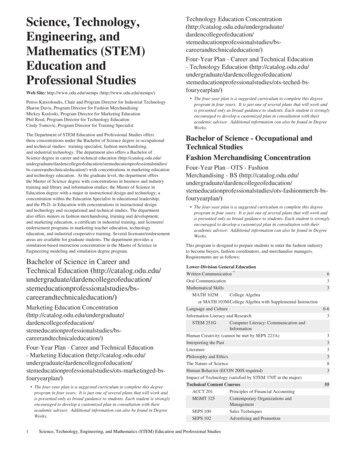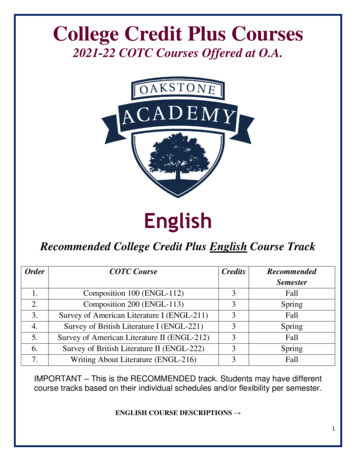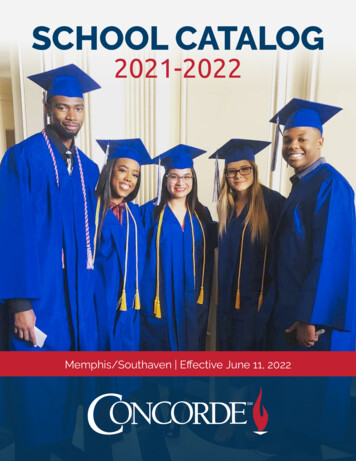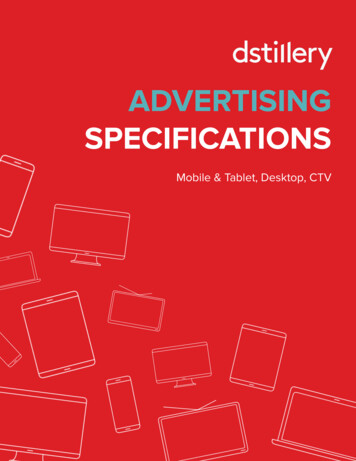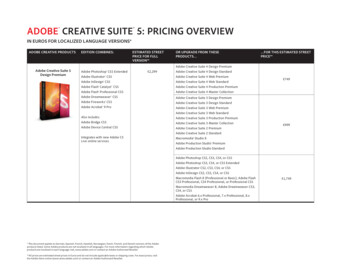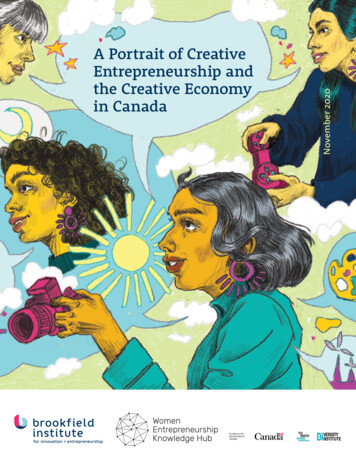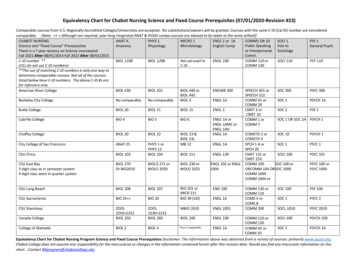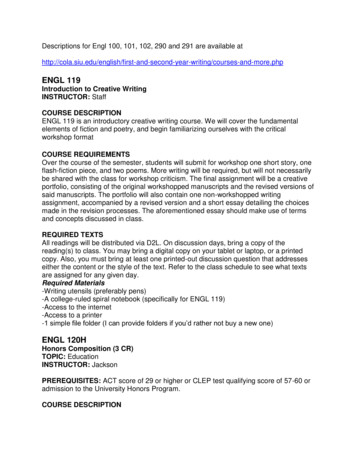
Transcription
Descriptions for Engl 100, 101, 102, 290 and 291 are available r-writing/courses-and-more.phpENGL 119Introduction to Creative WritingINSTRUCTOR: StaffCOURSE DESCRIPTIONENGL 119 is an introductory creative writing course. We will cover the fundamentalelements of fiction and poetry, and begin familiarizing ourselves with the criticalworkshop formatCOURSE REQUIREMENTSOver the course of the semester, students will submit for workshop one short story, oneflash-fiction piece, and two poems. More writing will be required, but will not necessarilybe shared with the class for workshop criticism. The final assignment will be a creativeportfolio, consisting of the original workshopped manuscripts and the revised versions ofsaid manuscripts. The portfolio will also contain one non-workshopped writingassignment, accompanied by a revised version and a short essay detailing the choicesmade in the revision processes. The aforementioned essay should make use of termsand concepts discussed in class.REQUIRED TEXTSAll readings will be distributed via D2L. On discussion days, bring a copy of thereading(s) to class. You may bring a digital copy on your tablet or laptop, or a printedcopy. Also, you must bring at least one printed-out discussion question that addresseseither the content or the style of the text. Refer to the class schedule to see what textsare assigned for any given day.Required Materials-Writing utensils (preferably pens)-A college-ruled spiral notebook (specifically for ENGL 119)-Access to the internet-Access to a printer-1 simple file folder (I can provide folders if you’d rather not buy a new one)ENGL 120HHonors Composition (3 CR)TOPIC: EducationINSTRUCTOR: JacksonPREREQUISITES: ACT score of 29 or higher or CLEP test qualifying score of 57-60 oradmission to the University Honors Program.COURSE DESCRIPTION
English 120 Honors Composition will introduce students to strategies for criticallyreading, thinking, researching, and writing in academic communities. Assignments willfocus on anchor standards found in the Common Core Standards for reading, writing,listening and speaking. Additional coursework will include discussion of and/or writtenresponses to assigned reading from CCSS Exemplars.STUDENT LEARNING OBJECTIVES: Students will be able to: (a) reinforce their goodhabits for writing by writing routinely over extended time frames (research, reflection,and revision; (b) read closely to determine the text and connect text to text, text toworld, and text to self; (c) use technology, including the Internet, to produce and publishwriting; (d) prepare for and participate effectively in a range of conversations andcollaborations with diverse partners.Course Resources:I encourage you to make extensive use of the Writing Center, beginning early in thesemester. Their URL is http://www.siu.edu/ write/I am happy to make accommodations for students with documented learning disabilities.Students with disabilities who need accommodations must provide documentation fromthe Disabled Student Support center during the first two weeks of the course.If you have any questions, comments or concerns, please do not hesitate to email me,or visit me during my office hours.REQUIRED TEXTS Darling-Hammond, Linda. The Flat World and Education: How America’s Commitmentto Equity WillDetermine Our Future, 2nd ed., 2010. Teacher’s College Press. ISBN 9780807749623 Harvey, Michael. The Nuts and Bolts of College Writing. Indiana: Hackett, 2013. ISBN9781603848985 A variety of selected readings (books, journals) throughout the semester.ENGL 120HHonors Composition (3 CR)TOPIC: Education ReformINSTRUCTOR: Prof. Jane Elizabeth DoughertyPREREQUISITES: ACT score of 29 or higher or CLEP test qualifying score of 57-60 oradmission to the University Honors Program.COURSE DESCRIPTIONEnglish 120H is an intensive theme-based rhetoric course that involves students inintensive study of a controversial issue in modern society. In this particular section ofHonors Composition we will focus on education reform. Through discussions, coursereadings, and student research we will explore as many aspects of this issue as we canand seek to join the academic and popular conversation on education reform.
COURSE REQUIREMENTSCourse Policies and Procedures:Attendance, preparation, and participation are mandatory. You are allowed two freeabsences for any reason you wish, including car trouble, minor illness, beautiful springdays, or that big midterm for which you need to study. You may also have certainabsences, for major illness, family emergencies, or sports participation, excused byspeaking with me and presenting a note from the appropriate person; religious holidaysare automatically excused. Any absences that are neither free nor excused will dropyour final grade by 20 points for each absence. Too many accumulated absences couldcause you to fail the course despite passing grades on your work.Class participation counts for about ten percent of your grade and is essential to doingwell in the course. I expect you to have the reading done for each class and will reservethe right to administer reading quizzes if I feel that students are coming to classunprepared.Quite a bit of writing will be expected of you in this course.The points values of the papers are as follows:Personal response essay 25 pointsStatement of research interest 25 pointsSummary and critical engagement essay 50 pointsAnnotated bibliography /research proposal 100 pointsOral presentation 50 pointsExploratory research essay 100 pointsCall-to-action 100 pointsParticipation 50 pointsEffort and progress 20 pointsTOTAL AVAILABLE 520 pointsFinal grades will be calculated as follows:Above 460 points: A400-459 points: B340-399 points: C320-339 points: DBelow 320 points: FPlease note that deliberately claiming the ideas of others as your own is grounds notonly for failure of the course, but expulsion from the university. All students are requiredto sign up for TurnItIn.com (course ID 7508947, password pedagogy) by the third weekof the semester, and to submit papers electronically as well as in hard copy.REQUIRED TEXTSGoshert, John. Entering the Academic Conversation: Strategies for Research Writing.Hirsch, E.D. Cultural Literacy: What Every American Needs to Know.Maimon, Elaine, Janice H. Peritz and Kathleen Blake Yancey. A Writer’s Resource. 3rded.
Rose, Mike. Lives on the Boundary: A Moving Account of the Struggles andAchievements of America’s Educationally Underprepared.ENGL 120HHonors Composition (3 CR)TOPIC: Six Good BooksINSTRUCTOR: Prof. K. K. CollinsPREREQUISITES: ACT score of 29 or higher or CLEP test qualifying score of 57-60 oradmission to the University Honors Program.Course DescriptionLike any composition course, English 120H aims to foster good writing. This section of120H does that, as a start, by requiring good reading: six very fine and very powerfulbooks. We will analyze them carefully, asking why they are put together as they are,teasing out their subtleties, and figuring out ways to write suitable essays on them. Eachstudent will submit six such essays, ranging from a personal response to a controlledresearch paper; improvement counts, as do helpful contributions to class discussion. Inthis section of 120H our slogan is Read, respond, explain. You will learn how to movesmoothly from one stage to the next, and to account for your response to a text bywriting on it clearly and logically, with evidence from the text itself.We begin with nothing less than a founding document on love, Plato’s Symposium. Forcomparison and contrast (mostly contrast), we then take up Sigmund Freud’sCivilization and Its Discontents, a profound meditation on the psychic costs of social life.Freud’s treatment of aggression will lead us back several centuries to The Prince, byNiccoló Machiavelli, an influential Renaissance handbook on getting and keepingpower—also a subject (treated very differently) in our next book, The Fire Next Time, aCivil Rights masterpiece by James Baldwin. Keeping to the topic of power andpowerlessness, we turn to Elie Wiesel’s Night, about a boy’s experiences in World WarII German concentration camps. To finish the course we recap some leading themesfrom our first five books by tracking them in Frankenstein, supplementing it with critical,biographical, and scholarly works on Mary Shelley and this, her phenomenally famouscreation.Course objectives: (1) to impart close, specific knowledge of six important books ofvarious styles, genres, and periods; (2) to increase your competence in interpretingthese books by reference to their central literary, historical, and cultural contexts; (3) toimprove your ability to discuss these books in an intelligent and logical fashion; and,most important, (4) to improve your ability to write about these books in logical, specific,and well-organized analytic prose, with appropriate attention to conventional Englishusage and to the support of claims with relevant evidence from the texts, and in thecase of Frankenstein (and perhaps The Prince) to incorporate pertinent scholarship andcriticism on the work, making room in your own analysis for the judgments of otherwriters.
COURSE REQUIREMENTSTimely and careful reading of all texts and any assigned supplementary material;regular attendance and active participation in class discussion; occasional in-classwriting and/or quizzes; and six formal essays ranging in nature from personal responseto critical analysis to controlled research paper.REQUIRED TEXTSPlato, The Symposium, trans. Christopher Gill (Penguin Classics)ISBN 9780140449273. Paperback retail (new) 8.49– 10.00.Sigmund Freud, Civilization and Its Discontents, trans. James Strachey (Norton)ISBN 9780393304510. Paperback retail (new) 10.99– 14.95.Niccoló Machiavelli, The Prince, 2nd ed., trans. and ed. Robert M. Adams (NortonCritical)ISBN 9780393962208. Paperback retail (new) 14.00– 17.50.James Baldwin, The Fire Next Time (Vintage)ISBN 9780679744726. Paperback retail (new) 10.18– 13.00Elie Wiesel, Night, trans. Marion Wiesel (Hill and Wang)ISBN 9780374500016. Paperback retail (new): 5.11– 9.95.Mary Shelley, Frankenstein, 2nd ed., ed. J. Paul Hunter (Norton Critical)ISBN 9780393927931. Paperback retail (new) 10.00– 15.00.Please note that these texts, in these specific paperback editions, are required, notrecommended. Electronic editions of these texts are not permitted in this course, and allelectronic devices must be off and stowed for the duration of each class.ENGL 120HHonors Composition (3 CR)TOPIC: Noir Literature and Film: Black Eyes and Super Dicks.INSTRUCTOR: Prof. Tony WilliamsPREREQUISITES: ACT score of 29 or higher or CLEP test qualifying score of 57-60 oradmission to the University Honors Program.COURSE DESCRIPTIONThis topic will concentrate on Noir Literature and Film in terms of the development ofnew ethic and gender sensibilities from the era of the classical period to the latetwentieth century. It will reveal how the fictional foundations set by Dashiell Hammettand Raymond Chandler develop into more "diverse" forms of sensibilities within thefiction of writers such as Donald E. Westlake, Chester Himes, Walter Mosely, and SaraParetsky as well as direct and indirect cinematic representations.Hammett's RED HARVEST reveals the blurring of boundaries between Western andUrban Noir that has influenced diverse forms of representations in other nationalcinemas such as Kurosawa's YOJIMBO and Leone's A FISTFUL OF DOLLARS with theContinental Op influencing later images such as Kurosawa's Sanjuro, Leone's The Man
with No Name, and Bruce Willis's "(Macho) Man for All (American) Seasons as seen inWalter Hill's LAST MAN STANDING. The period racism of the opening chapter ofFAREWELL MY LOVELY is countered by the African-American work of authors such asChester Himes and Walter Mosely with the former re-envisaging Chandler's Marloweinto Coffin Ed and Gravedigger Jones of the Harlem novels and Walter Mosely's EasyRawlins in the post-war LA setting of DEVIL IN A BLUE DRESS. The 70s sees theexplosion of black private eye films such as the Shaft series starring SIU alumnusRichard Roundtree and the significantly titled BLACK EYE starring Fred Williamson.While no satisfactory film version has been made from the V.I. Warshawsky novels ofSara Paretsky, ECOUTE VOIR (1979) starring Catherine Denueve as a female Marlowewill complement the selection of KILLING ORDERS where V.I.W. takes on the Alliedforces of the Church and the Mob in Chicago.COURSE REQUIREMENTSSince ENGL 120 H. is an Honors Composition class, writing assignments will be anessential aspect of the required work. No quizzes or tests will be given. Instead, you willbe assigned five essay questions at the beginning of the class at the back of thesyllabus that you are expected to answer, minimum length six full pages.REQUIRED TEXTSRed Harvest, Farewell my Lovely, The Hunter, Cotton Comes to Harlem, Devil in a BlueDress, Killing Orders.Engl 121.02The Western Literary TraditionTopic: Self, Society, Heroes, and HellINSTRUCTOR: Prof. M. Addison AmosCOURSE DESCRIPTIONCourse narrativeThe influence of the western literary tradition on contemporary western culture isundeniable (though far from unproblematic); however, tracing the impact theseEuropean texts have had on the ways we view ourselves and our society is a lesscertain task. In this course we will read a number of the cornerstones of westernliterature not only for the structures and elements they have contributed to our literarytradition, but also for images and expectations that have escaped the realm of fictionand colored the way we define and view ourselves and the lives we lead. One particularpoint of examination will be representations and functions of Hell, both religious andsecular, and its (necessary) binary, as they exist in ways real and imagined.FocusOur focus will be trifocal: we will examine foundational texts in relationship to thedevelopment of fiction, 1) setting each within the context of the societies from and intowhich each was written, 2) examining the place each holds in the development of the
United State’s current literary tradition, and 3) limning their impact on the direction andgoals of our contemporary society. In examining the cultural work of these texts we willconsider the roles that class and gender have and do play in our society’s definitions ofindividuality and personhood. Thus our approach will be at once historical, literary andcultural. We will study works including the Bible, Homer’s poetry, Dante’s Inferno,Geoffrey Chaucer’s Canterbury Tales, Shakespeare’s drama, and Jean Paul Satre’s NoExit.Traditionally, the literary canon has excluded all but a handful of women authors—andthose admitted only grudgingly—and so in our examination of Classical, Medieval, andRenaissance literatures, we will broaden our focus to include texts by women authorsthat, while circulated and read since their production, have only recently beenconsidered for inclusion in the literary canon.In short, the Western Literary Tradition offers a selection of texts that millennia havedetermined to be the very best Western literature has to offer and invites you to revel intheir glories while unraveling their tensions.Course goalsReading and comprehensionStudents will read and study major western literary works with the following goals:-to trace the development of the current canon of western literature-to gain a general understanding of several different literary genres-to attain a working knowledge of the historical and cultural contexts in which theseworks were written, received, and evaluated, with especial attention to issues of class,identity, and gender-to develop interpretive reading skills and a critical vocabulary for analyzingliterature-to organize and present material and analyses to others through planning anddirecting class sessions-to sharpen writing skills, focussing on clear expository literary analysis-to develop the ability to articulate arguments and analyses orally through regularparticipation in class discussion.Writing and comprehensionStudents will engage in writing projects with the following goals:-to use writing as an empowering tool that involves them actively in learningthe subject matter of the course-to internalize modes of inquiry or ways of thinking about particular disciplines-to practice formal and stylistic conventions of literary criticism and analysis-to develop confidence in their ability to use writing as a means of participating inacademic and public life.COURSE REQUIREMENTSTo provide a range of opportunities for involvement, assignments will be distributedamong a variety of writing assignments and in-class presentations:
-short response essays and informal responses (20%)-informal quizzes, formal exams, and a final exam (40%)-two short, formal essays, may be expansions of response essays (20%)-formal presentations and class participation, including contribution, recitation, andattendance (20%).REQUIRED TEXTSThe Norton Anthology of Western Literature, 9th edition, Volume 1, ISBN-100393925722No Exit, Jean Paul Sartre, ISBN-10 0573613052, ISBN-13: 978-0573613050, or almostany editionEngl 121.02The Western Literary TraditionTopic: What is Epic?INSTRUCTOR: Prof. P. McGrathCOURSE DESCRIPTIONWhat is epic poetry and where does it come from? What does it mean to call something“epic”? What do epic poems say about the societies—their morals, values, religion,sexuality, social hierarchy, politics, history—that produce them? Why is it that certaingenres of poetry disappear with time, but epic has remained a consistent feature of theWestern literary tradition? What is it in epic that we can’t do without? To answer thesequestions, we’ll read examples of epic poems from the classical (the Iliad), medieval(Beowulf), and early modern (Shakespeare’s Hamlet, John Milton’s Paradise Lost)world. The class will ultimately consider how poems about warriors and godsperforming extraordinary feats get transformed into stories about women and men doingordinary—but somehow still no less epic—things.COURSE REQUIREMENTSTwo ExamsThree Papers (5 pages)Class ParticipationREQUIRED TEXTSHomer, The Iliad, translated by Richmond Lattimore ISBN 978-0226470498Beowulf, translated by Seamus Heaney ISBN 978-0393320978William Shakespeare, Hamlet (Folger Shakespeare Library Edition) 978-0743477123John Milton, Paradise Lost ISBN 978-0140424393ENGL 204-950 (online)Literary Perspectives on the Modern WorldTopic: Literature of WarINSTRUCTOR: Prof. Klaver
COURSE DESCRIPTIONA course in the SIUC Core Curriculum, Engl 204 may be used as credit toward theHumanities in the Disciplinary Studies division. This particular version of the course,“Literature of War,” aims to introduce students to the literature associated with the majorwars of the twentieth century: World War I, World War II, and the Vietnam War. Thereare two units at the end of the course devoted to the Iraq War. The course offers thestudent British, American, and even German writings on the wars as well as the genresof poetry, fiction, drama, memoir, and film. It also introduces the student to importantliterary terminology and the historical context.COURSE REQUIREMENTSReading the assigned material.Seven written assignments, worth 20% of the final grade.Four Exams, worth 80% of final grade.REQUIRED TEXTSAny edition of the following texts is allowed. However, the texts listed below correspondto the citations given in the Study Guide.Hemingway, Ernest. A Farewell to Arms. New York: Scribner, 2003. 0743297334Ionesco, Eugène. Rhinoceros and Other Plays. New York: Grove Press, 1960.0802130984Kovic, Ron. Born on the Fourth of July. New York: Akashic Books, 2005. 1476764522O’Brien, Tim. The Things They Carried. New York: Mariner Books, 2009. 0544309766Vonnegut, Kurt. Slaughterhouse-Five. New York: Dial Press, 2009. 0385333846There are five films in the course you will be asked to watch. You should be able to findthem at a library, video store, or on-line.All Quiet on the Western FrontDas BootBorn on the Fourth of JulyThe Hurt LockerThe Sands of Iwo JimaENGL 205AMERICAN MOSIAC IN LITERATURE (3 CR)INSTRUCTOR: JacksonPREREQUISITES: Engl 102 or equivalent.COURSE DESCRIPTIONThis class is a must take course for students who want to know more about Americaand her immigrant families. The course covers material about the first inhabitants ofAmerica (First Americans/Native Americans), the Early immigrants (First and Second
Wave) and their adaptations to the New World, the Chinese immigrants (The GoldRush), The Great Migration (Harlem Renaissance/Civil Rights Movements), Migrantsand Migrant Workers (Puerto Ricans, Mexicans/Chicanos), Japanese immigrants (TheInternment), as well as the New Immigrants of the Twentieth-First Century.The assigned readings of this class are filled with history, disappointments, humor,success and daily life happenings. The assigned readings will reflect your family life orthe life of others. There are many great discussions and most importantly, the classhelps to preserve cultural differences, provides opportunity for self-discovery to resolveconflict arising from differences in others without the loss of self.This is a great class for students who want to better understand America and her peopleand the great contributions that so many have made to make America what she is todayand what she will become tomorrow. Her greatness depends on what you know andthink about her history.COURSE REQUIREMENTS Dialectal Journals Articles Response EssaysREQUIRED TEXTS Rico, B. & Mano, S. AMERICAN MOSAIC MULTICULTURAL READINGS INCONTEXT. 3rd ed. Cengage, 2000. ISBN 9780395886618 Erdrich, Louise. THE BEET QUEEN. Harper Perennial, 2006. ISBN 9780060835279 Morrison, Toni. THE BLUEST EYE. Holt, Rinehart & Winston, 1970. ISBN9780375411557 Villasenor, Victor. RAIN OF GOLD. Delta, 1992. ISBN 9780385311779 McCourt, Frank. ANGELA'S ASHES. Scribner, 1999. ISBN 9780684842677 Auch, Mary Jane. ASHES OF ROSES. Laurel Leaf, 2004. ISBN 9780440238515 Santiago, Esmeralda. ALMOST A WOMAN. Turtleback, 1999. ISBN 9780613241410 Donato, Pietro di. CHRIST IN CONCRETE. Signet Classics, 1993. ISBN9780451525758ENGL209.1Introduction to Forms of LiteratureTOPIC: Representing Poverty in U.S. LiteratureINSTRUCTOR: Prof. ShapiroCOURSE DESCRIPTION“The American is a new man,” J. Hector St. John de Crèvecœur famously wrote inLetters from an American Farmer (1782). “From involuntary idleness, serviledependence, penury, and useless labor,” Crèvecœur continues, “he has passed to toilsof a very different nature, rewarded by ample subsistence. This is an American.” The
U.S., so the story often goes, is supposed to be—is destined to be—a country wherepoverty doesn’t exist.Yet, poverty does exist in the U.S., and the organizing theme of this version of ENGL209 is U.S. literature’s encounter with poverty. Indeed, many significant works of U.S.literature have taken up the challenge of making sense of U.S. poverty, and our goal inENGL 209 will be in turn to make sense of how—and, crucially, with whatconsequences—U.S. writers have written about poverty. How, we will ask, has povertyshaped U.S. literature? And, how might the literary representation of poverty teach ussomething about poverty? In order to answer these questions, we will investigate adiverse range of representations of poverty and the poor from the late nineteenthcentury to the present, tracing the ways in which these representations have contributedto conversations about race, class, and gender in the United States.Students in ENGL 209 will be introduced to different genres and modes of representingpoverty, from non-fictional documentary prose and autobiography to short stories,novels, poems, and even films.COURSE REQUIREMENTSStudents will become familiar with the kinds of analysis, research, and critical writingthat characterize college-level literary study. Students will also develop their writingskills in ENGL 209 by writing a series of short essays and a final research-based paperon the course’s capstone text, Tillie Olsen’s Yonnondio: From the Thirties.REQUIRED TEXTSFictionSelected short stories by Herman Melville, Dorothy Allison, Pinckney Benedict, andSandra Cisneros (handouts)Horatio Alger, Ragged Dick (Signet, 2014—University Bookstore)ISBN-13: 978-0451469595Stephen Crane, Maggie (Penguin Classics, 2000—University Bookstore)ISBN-13: 978-0140437973Tillie Olsen, Yonnondio: From the Thirties (Bison Books, 2004—University Bookstore)ISBN-13: 978-0803286214Tomás Rivera, .y no se lo tragó la tierra / .And the Earth Did Not Devour Him (ArtePublico, 2015)ISBN-13: 978-1558858152NonfictionMargaret Bourke-White and Erskine Caldwell, selections from You Have Seen TheirFaces (University of Georgia Press, 1995—Morris E-Reserves)Jacob Riis, How the Other Half Lives (Bedford/St. Martin’s, 2010—University Bookstore)ISBN-13: 978-0312574017Richard Wright, Black Boy (Harper Perennial, 2007—University Bookstore)ISBN-13: 978-0061130243Poetry
selected poems by Langston Hughes, Edwin Markham, William Carlos Williams, LolaRidge, Edwin Rolfe, and Genevieve Taggard (handouts)FilmsThe Grapes of Wrath, dir. John FordWinter’s Bone, dir. Debra Granik
either the content or the style of the text. Refer to the class schedule to see what texts are assigned for any given day. Required Materials-Writing utensils (preferably pens) -A college-ruled spiral notebook (specifically for ENGL 119) -Access to the internet -Access to a printer
